Kristine Hughes's Blog, page 113
February 25, 2013
Beau Brummell's London Townhouse For Sale
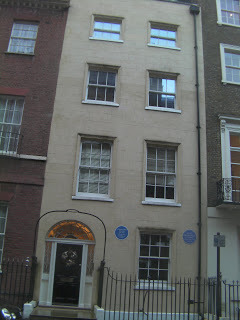
After reading my "Couple In England" post on my outing in Mayfair and my stroll to Beau Brummell's London townhouse in Chesterfield Street, author Rosemary Stevens just informed me that it has been on the market for nearly a year, with an asking price of nearly nine million pounds. Which firmly places it out of my price range, alas. Rosemary suggested that we all pool our money in order to buy it. A grand idea, but not practical when you figure out that we'd need at least five hundred some odd people to go in on it aside from ourselves. Not only would the crowd of us not fit in the house, but if we time shared the place, we'd each only get a half day each year. Sigh. Here's the listing. Read it and weep. I know I did.
Published on February 25, 2013 00:00
February 23, 2013
The Secrets of Bloxley Bottom, Episode 3: Monty Mulls It Over
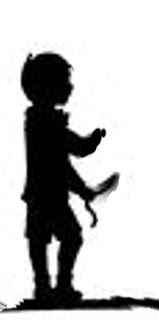 Billy Green barely caught a glimpse of the Duke in the village road before he ran out back in order to find his boots. He needed to run across the fields and though he’d rather go barefooted, he didn’t dare. If he stumbled, he’d not get to Mr. Monty fast like he’d promised. Once booted, Billy threaded his way through the buildings behind the inn and dashed across the village green, then through the copse that bordered the river. When he reached the bridge he glanced back at the road and saw the Duke’s riderless horse being walked around behind the Dower House. It was another field or two to cover before he reached Mr. Monty’s and he kept up a fast pace, gulping huge breaths as he ran. Mr. Monty had promised him a shilling for news of the Duke, practically a fortune. And Billy wanted a shilling of his own. He knew just where he’d hide it.
Billy Green barely caught a glimpse of the Duke in the village road before he ran out back in order to find his boots. He needed to run across the fields and though he’d rather go barefooted, he didn’t dare. If he stumbled, he’d not get to Mr. Monty fast like he’d promised. Once booted, Billy threaded his way through the buildings behind the inn and dashed across the village green, then through the copse that bordered the river. When he reached the bridge he glanced back at the road and saw the Duke’s riderless horse being walked around behind the Dower House. It was another field or two to cover before he reached Mr. Monty’s and he kept up a fast pace, gulping huge breaths as he ran. Mr. Monty had promised him a shilling for news of the Duke, practically a fortune. And Billy wanted a shilling of his own. He knew just where he’d hide it.But in truth he would have performed the errand for nothing. He’d do anything for Mr. Monty. For Mr. Monty or for Mrs. Cubbins, the cook at the Dower House who fed him cakes and let him finish the soup too, even take some for his sisters. At the cottage, his ma did little more than holler at him to do his chores, but Mr. Monty patted his shoulder and called him Billy-boy. And Mr. Monty was one of the few adults Billy had known to put aside whatever it was that he was in the middle of in order to listen to him. And when he spoke to him, Mr. Monty looked Billy right in the eyes. A rare thing, Billy reckoned, in the world of adults. And Mr. Monty was generous with the dosh. Today’s coins wouldn’t be the first Billy had earned. Mr. Monty had a shed full of old clobber, tables and mirrors and vases and suchlike he wanted polished before the swells came to look over the lot.
Mr. Monty’s house was in sight now. Billy picked up his pace and ran into the kitchen yard to look for Stanton, Mr. Monty’s man. He yanked a rope that rang a bell above his head and sank onto the grass below it, gasping for breath.
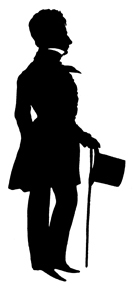
A quarter hour later, Montague Twydall cantered across the field towards the Dower House on his bay cob. Tall, trim and tricked out in his usual fashionable attire, Monty looked for all the world like the personification of a romantic hero. With his black hair and military air, Monty could have had any lady he fancied. It was a great pity, believed the local mamas, that Monty fancied none of them. Whilst he enjoyed a bit of horizontal exercise as much as the next man, Montague Twydall had long ago decided that he did not want a female permanently under his roof. He hadn’t the time. Nor the patience. A woman around the house, nattering on unceasingly about her relations, her rounds of visits and her modiste would be nothing but a burden to him. He’d rather return to active military service, a thing he'd thoroughly detested. And, truth be told, if Monty were to worry himself over the latest fashions, hats and fripperies, he was more likely to worry about them as they applied to himself, rather than to someone else.
Just now, however, Monty’s head was full of alternative approaches to the Duke about the items for which he wanted to be paid in good English sterling. Monty was low on ready money and a solid sale to the Duke of either item, or both, would set him up a treat. He had to be careful in how he represented the robe to the Duke. Or anyone else, for that matter. The story that it had belonged to Joséphine de Beauharnais could not be proven, even though the velvet and ermine robe had the initials JB entwined in gold embroidery. For all Monty knew, it could have been the property of one Jenny Brown. His French agent suggested he pawn it off as a Napoleonic relic and play upon a possible connection to Joséphine, the first Empress of the French. The connection could either help or hinder his chances of selling it to the Duke, who hadn’t seemed to mind collecting Napoleonic relics in the shape of the defeated Emperor’s cast off mistresses, many of whom later went on to boast of their having being the mistress of both Bonaparte and Wellington. Which is the reason why he thought the Duke might also be interested in the pearls that had supposedly belonged to the famous contralto, Madam Grassini.
Monty chuckled to himself as he thought about the amorous rumours which had followed Wellington round Paris. He of all people had no reason to doubt them. He’d been in Paris only briefly whilst Wellington had been head wallah in the City, but Monty had seen firsthand how all the beauties of the French capital had swarmed the Duke. It had even been reported that Wellington was the better lover. How so, Monty could hardly imagine. The man had been constantly at his desk whilst in Paris, writing order after order, letter after letter, dispatch after dispatch. How had he found the time for such conquests? To Monty’s mind, a proper seduction called for a long, lingering evening of wine, supper and many sweet nothings whispered into shell-like ears. He wondered how Wellington had managed to seduce such experienced courtesans whilst visitors, both civilian and military, paraded through his rooms. If Wellington had had time for any seduction at all, he'd no doubt have suffered constant interruptions and been kept busy hopping off the couch in order to take up his pen and make notations to his voluminous correspondence. Monty was unable to picture any of the knowing ladies he'd met in Paris being willing to put up with that degree of romance interruptus, Wellington or no Wellington.
At the Dower House, Monty handed his mount over to a stable boy and realized that he’d allowed the Duke’s amorous adventures to keep him from fashioning the sort of opening gambit this proposed sale would require.
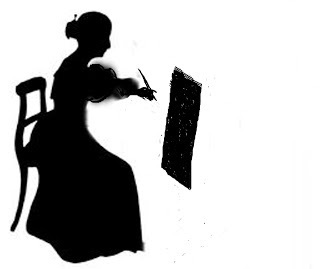
Not far down the road, Elizabeth, Baroness Bloxley, found it difficult to restrain herself from twirling about the morning room at Bloxley Hall. Instead, she sat silently in her chair, pressing the just-delivered letter to her heart and allowing herself a small smile. A shiver tickled her spine. The earl couldn’t have been more flattering in his praise of her illustrations. He wanted those she'd submitted – and more – for his book on Kent wildflowers. How absolutely, thrillingly perfect!
Now, when she was 44 years old, she’d been offered another chance to live her dreams of becoming a professional artist. A dutiful life and years of conforming to the ideals her mother had tried to instill in her were made worthwhile by this letter. After her marriage, Elizabeth had naturally given up her attempt to become a portrait painter, turned instead to motherhood and resigned herself to only occasionally executing watercolour landscapes. Now, at last, success. Recognition. Fulfillment.
Taking up her pen, Elizabeth copied the names of the first three wildflowers the earl wanted from her. They were probably blooming now, he’d written, so there was no time to lose in obtaining the specimens. The earl had used the three Latin names given by botanists to these flowers, but she knew two of them by their common names, the bluebell and the violet. They would be easy to acquire, as both were common to her own home park.
For a moment her heart dropped when she read the third name. What in the world was Symphytum officinale? She would have to look it up. She could most easily do that when Lionel was not in his study or the adjoining library. She did not know what he was doing there, but this was not the moment she wanted to tell him about her drawings for the earl. In the meantime, she would savor her secret. And she would take her drawing materials to the garden with a lightness of step she had not felt for ages.

Published on February 23, 2013 01:00
February 21, 2013
A Couple In England - Day Three -Part Two
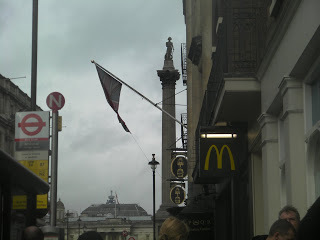
Leaving the Duke of York's Column, we headed towards Trafalgar Square and on towards Horse Guards.
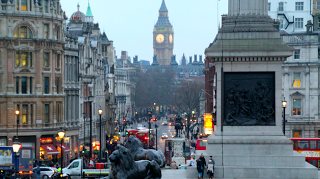
"Why is it that wherever we go in London, we're always passing either Big Ben or Apsley House?"
"Because London, old London, is not really that big. The City of London was known as the Square Mile. Strictly speaking, our hotel in Mayfair is without the City."
"Without the City what?"
"Outside the City. As far as the time periods and people I'm interested in go, the most important bits of London are bounded on the east by the Tower, in the west by Knightsbridge, to the north by Bayswater Road and to the south by Southwark."
"But why do you keep going to the same places every time you come to London? How many times have you been to Horse Guards?"
"Practically every time I've been in London."
"That's nuts. Why do you do it?"
"For the same reason that I keep returning to Apsley House. I'm hoping that one day I'll see the Duke of Wellington. The first Duke of Wellington. I keep going to St. James's Street because I'm hoping to spot Brummell walking into White's. And I go to the Burlington Arcade because I want to one day find my carriage and coachman waiting there for me. I can't actually go back to 19th century London, so I return to the scenes of the crimes, so to speak, and imagine what once was. Plus, while I do the rounds of the same places, I'm always looking at other areas surrounding them, too. Each time I explore some new aspect of the area."
"Your ghost is going to haunt London when you die."
"One can but hope."
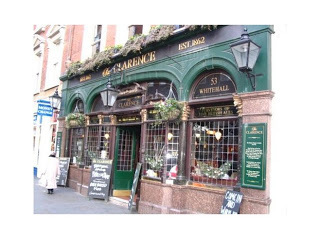
We walked down Whitehall and past the Clarence Pub, where Victoria and I have been known to raise a pint together, and were soon at Horse Guards.
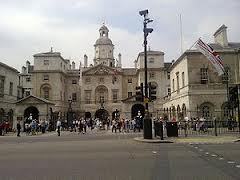
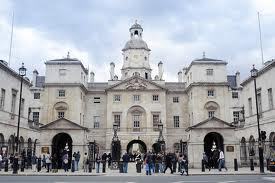
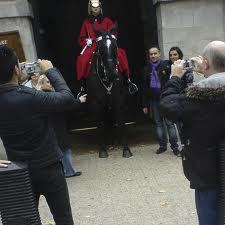
The Household Calvary on duty are an impressive sight and there are always tourists surrounding the mounted guards and taking pictures. On this particular day, the crowds were huge - one could barely navigate the sidewalk for all the people pressing in to see the guards.
"Are they allowed to get that close? Look, the horse doesn't like it, he's tossing his head. Hey, they're touching the horse. Are they allowed to do that?
"I don't think there's a rule that you can't get that close, but I've never seen the guards being that crowded before."
"Why don't they back off? It's crazy." No sooner had Hubby voiced these words than the mounted guard slowly, but deliberately, backed his horse further into the archway. Still looking straight ahead, we watched as he raised his right arm and began pushing a button on the interior wall. It was as contained as a cry for help could be.
"Did you see that?" Hubby asked.
"Yeah. I didn't even know they had panic buttons in there. Come on, let's get out of this crowd."
"Are you nuts? I'm not leaving until I see who comes to rescue him."
So we waited. And waited. And waited. Reader - no one came to his rescue.
"I can't believe no one is coming," Hubby said, disappointed.
"No doubt they have cameras watching. Maybe whomever is manning them looked at the situation and didn't deem it enough of an emergency to send the guards. Come on; no one is coming so let's go."
We walked through the courtyard and into the archway that leads to the back parade ground.
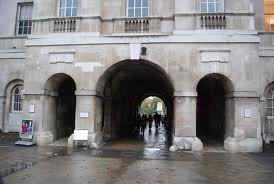
There is always a guard stationed in the arch, near the entrance to what was once the Duke of Wellington's office.
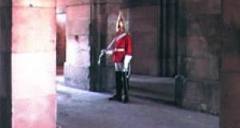
"This is where they had the beach vollyeball during the Olympics," I told Hubby when we came out into the rear yard.
"Uh huh."
"You know, everyone goes to the Palace to see the changing of the guard, but if you come here any day at 4 p.m. you can see the daily inspection parade. Then you don't have to fight the crowds. Although it's not the same, is it?"
"Uh huh. Why are we standing here? It's freezing."
Sigh. "I'm just taking it all in, communing with the history. Look up there, that's the window to Wellington's office."
"Uh huh."
"Let's go inside."
"Inside where? What's this?"
"The Household Calvary Museum."
"What's in there?"
"Household Calvary stuff!"
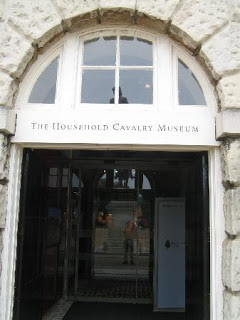
The Museum traces the history of the Household Calvary from the 1600's to present day and, once Hubby got a look a the uniforms, arms, saddles, etc., he got into the spirit of the thing.
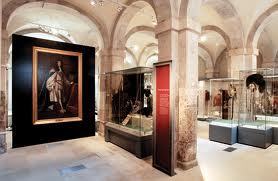
The Calvary's stable is adjacent to the Museum and there's a portion of the Museum that features a glass partition, through which visitors can see the horses in their stalls. It so happened that there was a guide on duty in the viewing room.
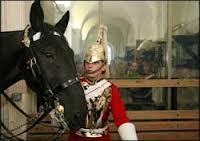
"Excuse me," I said, approaching him. "Can you tell me if Sefton is here?" Sefton, you may recall, was the Calvary horse who was injured but survived the 1982 IRA bomb in Hyde Park.
He gave me a sad smile and a pitying look. "Sefton is dead, Madam."
"The original Sefton is dead, yes. But in his honour there is always a horse named Sefton in the regiment. I just wondered if he was stabled here."
He seemed somewhat taken aback. "I didn't know that. And I don't know much about the individual horses kept here. There's a bit about Sefton in the museum, however, towards the end. You may be interested."
"No doubt. Thank you."
"Thank you, Madam."
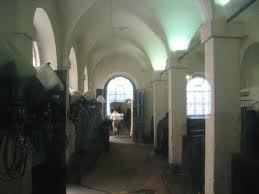
"I love it when you do that!"
"I didn't do anything. I just asked a question."
"I love it when you tell them stuff they didn't know and they give you that `just who the Hell are you?' look."
"Stop it."
"You should get a job here."
"At Horse Guards?"
"Somewhere in England, at a museum or a castle or something."
God, are you listening?
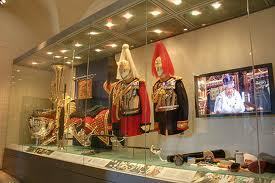
We spent the next half hour looking at the various displays, with a particular focus on Waterloo relics, like the pistol ball that wounded Sir Robert Hill and, in my opinion the best of the lot, the Marquess of Angelsey's artificial leg. You may recall my previous post on Paget's leg. If not, you can find it here.
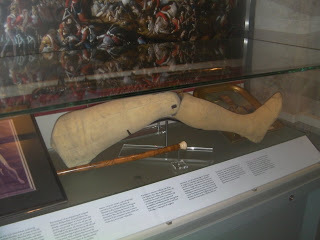
"Look, Paget's leg!"
"Who?"
"Henry Paget. Afterwards the Marquess of Angelsey. He ran off with the wife of Wellington's brother, Henry. Henry suffered a sort of mental breakdown and was unable to care for his children, who went to live with Artie and Kitty for a time. Later, at Waterloo, it turned out that Artie had to put up with having Paget on his staff. When the fighting was over, Artie and Paget were both on their horses, talking, when one of the last shots of the battle was fired and hit Paget, nearly taking his leg off. He had to have it amputated shortly afterwards."
"Maybe Artie shot him. Who could blame him?"
Who, indeed? We finished our visit to Horse Guards in the gift shop, where I bought the Christmas ornament below -
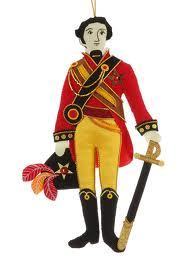
"I'll just take this," I said, pushing the ornament towards the clerk at the till. "Everyone should have the Duke of Wellington on their Christmas tree."
"Yes, they should," said the clerk. "Although you are the first person who's recognized it as being the Duke. Everyone else seems to think that it's Prince Albert."
Hubby put his lips to my ear and whispered, "That's my girl!"
Part Three Coming Soon . . . . .
Published on February 21, 2013 00:30
February 20, 2013
Parade's End Comes to the US
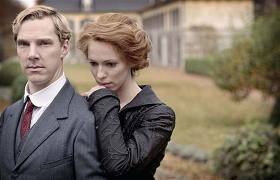
The five-part miniseries Parade's End, starring Benedict Cumberbatch, will be shown on HBO on February 26, 27 and 28, 2013.
Set in the World War I era, the HBO-BBC series was adapted by renowned playwright Tom Stoppard from four novels by Ford Maddox Ford. Rebecca Hall, Adelaide Clemens, Rupert Everett, Miranda Richardson, Jane McTeer and other well-known actors play the family and friends of Christopher and Sylvia Tietjens.
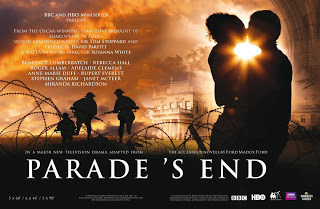
The series was broadcast last summer in the UK and earned critical kudos for all aspects of the script, acting, and production directed by Susanna White.
 Tom Stoppard This is Sir Thomas Stoppard's first television play in thirty years. His success with original drama and adaptations for films is legendary. Speaking for myself (Victoria here), I love the way his plays always have multiple levels of meaning. Arcadia is my absolute favorite. But the choice for second place among his works would be impossible, e.g. Rosencrantz and Guildenstern are Dead (play and film), Shakespeare in Love (film), etc. etc.
Tom Stoppard This is Sir Thomas Stoppard's first television play in thirty years. His success with original drama and adaptations for films is legendary. Speaking for myself (Victoria here), I love the way his plays always have multiple levels of meaning. Arcadia is my absolute favorite. But the choice for second place among his works would be impossible, e.g. Rosencrantz and Guildenstern are Dead (play and film), Shakespeare in Love (film), etc. etc.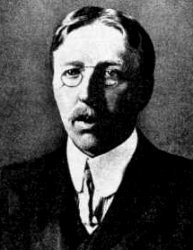
Ford Maddox Ford (1873–1939 wrote novels, poetry, and criticism; he edited several journals and was a well-known member of influential literary circles in the 1920's. He is probably best remembered for his 1915 novel The Good Soldier.
For more information, the trailer for the series, and interviews with participants, click here.
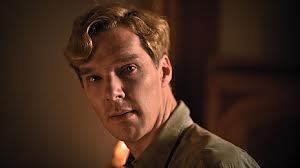
The series will be available on HBO On Demand in many markets -- or you can have a copy for yourself!
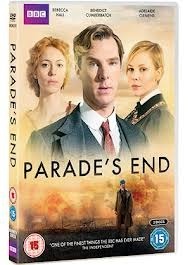
Published on February 20, 2013 01:00
February 19, 2013
The Secrets of Bloxley Bottom, Episode 2: The Duke Approaches
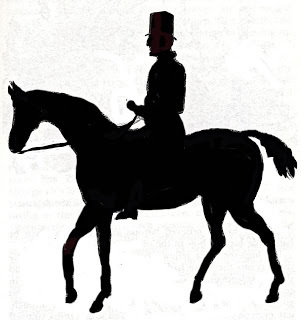
The Duke of Wellington, riding upright upon his horse, felt himself relax as he approached Bloxley Bottom. He came here often and, when he did, he was able for a time to put officialdom behind himself, as the villagers, whilst well aware of who he was and what his achievements were, tended to treat him rather more like a man than like a figurehead. Here in Bloxley, the Duke was able to interact with people on a more personal level, perhaps because he was such a familiar figure to them. Or perhaps because the people of Bloxley were less given to humbug than those who lived elsewhere.
Turning into the high street, the Duke looked forward to the routine that would momentarily begin at his approach, for he was a man who championed routine; a man who felt that routine gave structure to life, whether that life be spent in the military, the government, or in Bloxley Bottom. “Good day to you, yer Grace!” Walter Turner came out of his bakehouse, dusting his hands off upon his massive white apron. The Duke of Wellington gave Walter his usual greeting – a two fingered salute to the brim of his hat. “Walter, how is the family?”
Walter smiled up at the Duke, exposing wide, yellowed teeth that reminded the Duke of an ivory set of dominoes his ADC’s had played upon at Talavera.
"Oh, you know how they go, Duke,” chuckled Walter, “hard to live with, but impossible to live without. Can’t complain. Hey, I’ve got some loaves just come out the oven. I’ll put three by for you to take back to the Castle on your way home. And Mrs. Preston wanted you to know that she’s got ducks what are ready. If you are.”
Loaves, live stock and more were always offered up for the Duke. They were part and parcel of the routine.
“Duke! Dooooook!” Old Rodney Casper had weaved his way up the street towards the Duke and Walter. His first question would be yet another part of the routine.
“Parley vooo?” Whenever Rodney was in his cups, which was more often than not, he insisted upon speaking French to the Duke. The problem was, Rodney did not know how to speak the language. Why he supposed that the Duke regularly conversed in French remained a mystery to all.
“I’m right as rain, Rodney. And you?” “Come and see and come and say.” Rodney, in his musty, fusty mismatched suit of clothes and battered cloth cap, craned his neck, squinted his eyes and peered up at the Duke of Wellington for few moments before turning his attention towards Walter and giving his face the same intense scrutiny. Then, like some great bird, Rodney pulled his head back in and announced “Gotta be off.” With that, he tottered in place for a few moments, seemed to pick up some steam and then began the long stagger home.
The Duke of Wellington sighed and gathered his reins. “Please tell Mrs. Preston that I shall have a talk with Mrs. Allen regarding the ducks,” he told Walter. “We shall no doubt find use for them. We’re to have a full complement of guests beginning on Thursday.”
The Duke rode on until he reached the bend in the road which would ultimately bring him to the dower house, home of Louisa, Dowager Baroness Boxley. He prepared himself for his next routine encounter, this with a resident a bit more recently come to the village.
“Wait for it . . . . wait for it . . . .” the Duke muttered to himself as, beneath him, his mount, called Bedford after the county it had been born in, prepared himself, as well. The horse’s nostrils flared and its eyes, the whites wide, fastened upon to the thicket at the side of the road as a dog came bounding out of it towards the pair.
And what a dog it was. The deuced strangest looking dog that ever was, thought the Duke as he tightened up on the reins in an effort to calm the horse. The animal, which had appeared in Bloxley Bottom seemingly out of the clear blue sky about a year ago and taken up residence in the thicket, was unlike any other dog the Duke had ever laid eyes upon. Or rather he was too much like too many canines the Duke had seen. As the Duke had been known to say, this dog looked for all the world as though God, in a humorous frame of mind, had one day looked about his workshop, found spare parts left over from previous dogs he’d devised, cobbled the lot together and set it down in Bloxley to see what the villagers would make of it. In fact, one of the more witty townsfolk had named the dog Spot and Spot he'd remained, even though his coat was a uniform, unbroken shade of white.
The rear of the dog was narrow, like that of a terrier. Its mid-section gradually widened until it reached a great ruff of hair resembling the mane of a lion, which framed a massive head reminiscent of a bull dog, complete with a menacing under bite. Odder still, none of its various parts resembled any dog that had ever been known to inhabit the village.
 As ever, the dog reached a seemingly self-imposed boundary, sat down upon its haunches, lowered its massive head and commenced a great growling that began in the region of its tail. Up through its body the growl traveled, past its shoulders and into the sinewy neck, through its throat and out its fearsome mouth. “Arp.”
As ever, the dog reached a seemingly self-imposed boundary, sat down upon its haunches, lowered its massive head and commenced a great growling that began in the region of its tail. Up through its body the growl traveled, past its shoulders and into the sinewy neck, through its throat and out its fearsome mouth. “Arp.”The Duke laughed aloud. “Arp yourself, you great daft thing.” What a demmed disappointing bark it was. The build up to it was stupendous. The end result, only ever a single, feeble “arp,” another comedic stroke orchestrated by God in his heaven.
Reaching into his coat pocket, the Duke withdrew a handkerchief, from which he extracted two sausages he’d taken from the breakfast table that morning for just this purpose. He threw one, then the other, to the dog, who gobbled them down.
“Not a word to Mrs. Allen,” he warned the dog, “There’d be hell to pay if she knew where her good sausages had gone.” Mrs. Allen, the Duke’s housekeeper at Walmer Castle, was not overly fond of dogs.
After a moment the Duke trotted off. When he reached the bend in the road, the Duke did not avert his eyes, but at the same time raised his hat in silent salute to Aurelia, whom he was certain had watched his approach from behind her lace curtains.

Published on February 19, 2013 01:00
February 17, 2013
A Couple in England - Day Three - Part One
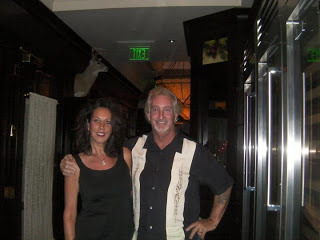
It occurs to me that since you've been invited along with the Hubby and I on our trip to England, you might like to see what your companions look like. The photo above was taken on my last birthday. We didn't take many pics of ourselves during the course of our trip to England - for reasons that will eventually become clear. In London, it was the weather or the fact that we're neither of us picture people to begin with.
We began Day Three as we had Day One and Day Two, at Caffe Nero. One of the handful of things the Hubby and I actually have in common is that we both turn our faces against breakfast. Give us a coffee and two cigs each and we're good to go. Our first destination was Buckingham Palace, via Green Park. This picture, taken as we entered the Park will demonstrate what a dreary day it was.
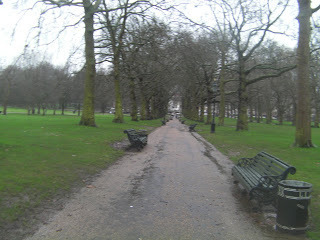
No sooner had we started towards the Palace then we came across this plaque for the Princess of Wales Memorial Walk. As you can see, I stopped to take a photo.
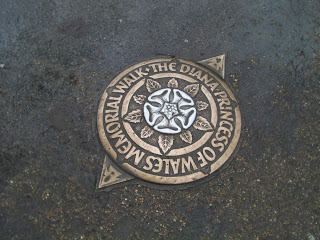
"This is the Princess Diana Memorial Walk," I said.
"Yes . . . I can see that."
"It winds through four London parks and takes in sites associated with her."
"Uh huh." At least he didn't say my good man.
I looked around at our surroundings. "Green Park." I sighed. "It was originally a burial site for lepers. Later, they had entertainments here, like ballonists and fireworks." He doesn't care! I reminded myself. I can't help myself! I rejoined. "Handel's Music For The Royal Fireworks was written specifically for a display here.The Earls of Bath and Bristol fought a duel here."
"Uh huh."
Leaving Hubby to his own thoughts (one can only guess) I began taking random photos of the park. The example below is a particular favorite of mine.
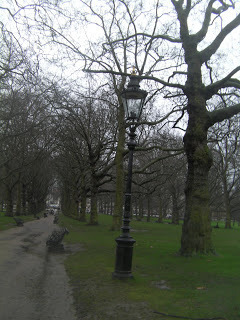
Before long, we had reached the Palace. There was only an abbreviated changing of the guard, as we were there on an off day and they really just trotted by on their way to the barracks. We missed most of the pomp and all of the circumstance, but it didn't matter. We were at Buck House and I took a few more photos to add to the hundred I've already taken of the environs.
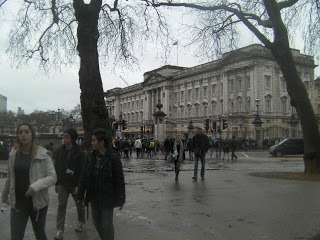
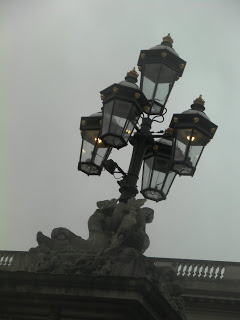
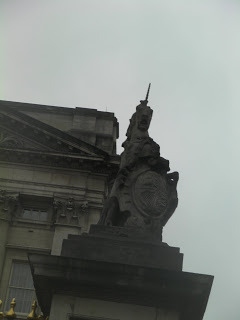
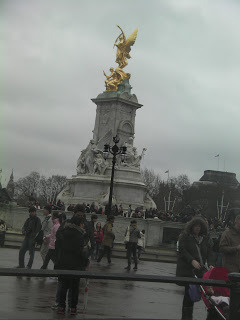
Finally, we gazed through the gates at the Palace.
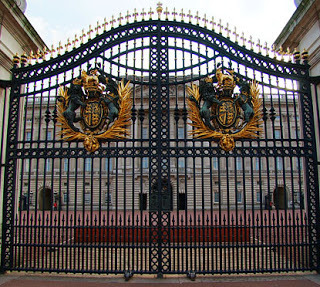
"We were inside there last time," I sighed.
"Yeah. That was great."
"You enjoyed it?"
"Sure! Who wouldn't? It was great. The best part was when you told that guide who the guy in the picture was."
What actually happened was that during the course of our evening champagne tour of the Palace, the guide showed our group around the throne room, but totally ignored a huge, full length portrait of a robed figure. As she walked away I approached her. "Excuse me," said I, pointing at the painting. "Isn't that a Wellesley?" Our guide seemed taken aback. "Why, yes. Yes it is."
"Isn't it Richard Wellesley, the Duke of Wellington's eldest brother?"
"I'm amazed that you know that," the guide had replied.
"Let me get this straight," I said to Hubby now. "You hate it when I go on about British history to you, but you like it when I point things out to others?"
"Yeah. I love it. The look on their faces is priceless."
Go figure.
We moved on and walked through St. James's Park on our way to Horse Guards and came upon a gaggle of friendly geese, birds and squirrels, all of whom charmed the Hubby, who stopped to admire them and suddenly didn't mind the cold.
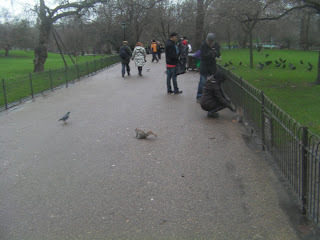
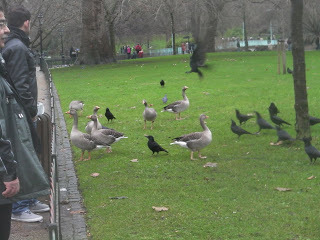
"I wish we had some bread," said Hubby. "Why didn't we bring bread?"
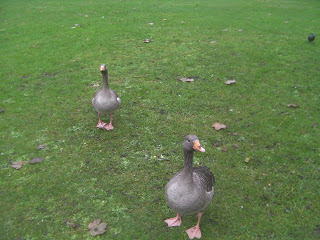
If the fowl were friendly, the squirrels were even more so.
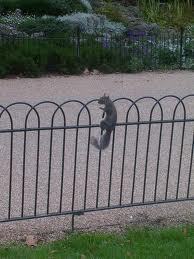
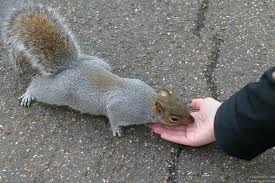
"Look. They're going right up to people. We should have brought some bread with us."
Hubby went on in this manner for quite some time, inexplicably entranced with London wildlife. Eventually, he began making noises meant to draw the squirrels nearer. "C'mere squirrel. Come on. Click, click, click. "Here boy . . . here boy . . . . that's it, good boy . . . . hey, hey, HEY!"
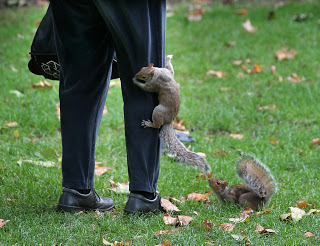
"Did you see that? He attacked me!"
"He didn't attack you! What did you expect with all that clicking and here boying?"
"It's not funny."
"It's hysterical. You jumped about three feet." Now I have to tell you that I didn't take the last picture, I stole it off the web. Apparently, the St. James's Park squirrels are known for this sort of behaviour. Oh, if only I'd had my own camera at the ready . . . . But I swear to you, the squirrel climbed up Hubby's foot and began to make its way up his leg until he did a version of the St. Vitus Dance and dislodged it. Reader, it was priceless.
"Just imagine if we'd brought bread with us," I said through gasps of laughter.
"Very funny."
"We should come back tomorrow with some croissants. Maybe you can get one of them to go for your neck."
"You're a regular riot, Alice."
Once we'd collected ourselves, we left the park and soon found ourselves at the Duke of York's Column.
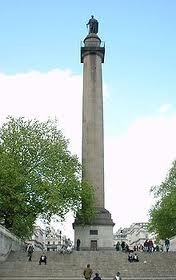
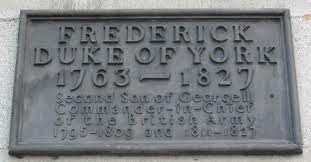
"That's the Duke of York's Column."
"Uh uh. Are we anywhere near where you're taking me yet? Where are we going again?"
"Horse Guards. Where the Duke of York had his offices. And more importantly, where Artie had his. He was married to Freddie."
"Artie was married to Freddie?"
"No! The Duke of York. But he had a mistress, Mary Anne Clarke, and there was a huge scandal when it came out that she was selling army commissions."
"The Duke of York had a mistress and a scandal and they gave him a column?"
"Freddie lived at Oatlands. We're going there."
"Now?
"No! Oatlands is near Windsor. We're going to Horse Guards now."
"What's at Horse Guards, anyway?"
"Horses. And Guards. Come on, you're going to love it."
"Riiight."
Part Two Coming Soon . . . . .
Published on February 17, 2013 00:30
February 15, 2013
The Secrets of Bloxley Bottom, Episode 1: Widow at the Window
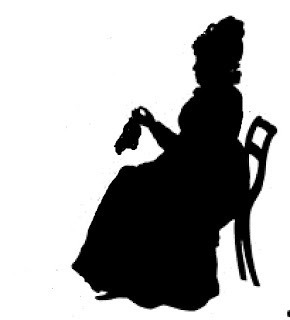 June, 1832
June, 1832Aurelia Gammersgill sat near the window in her parlor and pushed aside the lace curtain. Hilltop House was situated at the top of the village of Bloxley Bottom and afforded her an unobstructed view of all that transpired upon the road that sloped gently upwards towards her doorstep before it took a sharp turn westward. Aurelia required that her chair be placed in the path of the window’s natural light in order to attend to her needlework. The fact that this placement of her chair also afforded Aurelia an unimpeded view upon the village's inhabitants and their daily business was secondary. Or so she told herself. Whilst Aurelia sat here, however, she rarely missed seeing who was to-ing and fro-ing, who went into the bakery or who led horses to the blacksmith at the bottom of the road or who entered the Crowing Cock Inn.
Aurelia rarely observed much excitement. Most mornings found a small bustle of activity in and out of the bakery. Mr. Turner’s cinnamon-laced buns fed many a village household, not to mention anyone who happened to drop in at the Inn’s coffee room. And when the nearby shop received a new shipment of goods, word spread throughout the village in a trice. Many were the times Aurelia and Millicent had snatched up their bonnets in order to be amongst the early visitors to the yard goods counter or to inspect a newly arrived collection of colorful ribbon spools.
The road that wound its way through the village and past Aurelia's home was tree-shaded and bordered by flower-filledladen gardens and white-washed cottages along its upper reaches. The goose girl and her brother drove their flock to the green every morning, complicating the flow of carts and wagons in front of the blacksmith shop. The twice daily arrival of the coach from Canterbury on its way to Walmer and Deal brought the mail. If there were letters for Aurelia or Millicent, someone from the Crowing Cock Inn could be counted upon to deliver them within an hour of their arrival, though Millicent often sent their kitchen-girl to fetch the post if she were expecting a package. Millicent spent a great deal of her time and a fair share of her meager resources ordering goods from near and far, although the farther the better, and she relished receiving parcels in the mail. Whether they contained soap, confections or fabric notions, the contents of the parcels were more often than not a surprise to Millicent, who would have forgotten placing her orders by the time they had arrived.
This bright morning, Aurelia noted a lone horseman coming towards the bend in the road and she watched as he touched his hat to the various people who stood in the shop doorways. Long before she was able to make out his face, Aurelia knew it was the Duke, no doubt on his way to visit the dowager baroness, whose house stood less than a quarter mile west. Ah, the most excellent Duke of Wellington. How fortunate they were in their little village of Boxley Bottom to have him visit so often. Aurelia herself had taken tea in his presence several times when he’d arrived at Lady Louisa’s unexpectedly. Such a fine, erect figure of a man, and so courteous to everyone. It made her heart flutter to think she knew this national hero, the very man who had led the army at Waterloo. Let’s see, she thought. That would have been sixteen, no seventeen, years ago next month. Down the hill, the Duke stopped to speak to someone and Aurelia’s thoughts drifted back to the year 1815. Her husband had still been alive and representing clients in Crawley, just south of London. But he already suffered ill health. Two years later, she’d been left alone, long before she had ever expected to be widowed, especially without much in the way of means. Why he had not made provisions for her … she’d never understood. It had been necessary for Aurelia to sell their home and to withdraw to rented rooms in Tunbridge Wells where she lived for several years, enduring a long string of inelegant dishes – her landlady, Mrs. Scarcely, had lived up to her name, serving greasy mutton and limp cabbage for Sunday dinner.
How fortunate that she and Millicent had been able to combine their resources and find this comfortable home together, with a lovely church and unexpectedly agreeable company nearby. Millicent had her precious silver and Aurelia her fine china, which gave their little gatherings a particularly elegant touch. They were both happy with their quiet lives, gardening and working on silk-embroidered hangings for the church or for others in the village. Yes, Millicent was a worthy woman, and she always meant well, even if she more often than not spoke more than she ought. There were some who might consider Millicent a good natured gossip, though Aurelia would never say as much. The Duke's horse was moving along again, the Duke on his way to the Dower House to see the Dowager Baroness Bloxley. Lady Louisa lived along the road to Bloxley Park and the Hall itself. She had an imperious manner sometimes, Aurelia mused, but she was an earl’s daughter and probably had moved in more exalted circles when she was young, certainly more exalted than Bloxley Bottom’s collection of residents. But her loss was Aurelia’s and Millicent’s gain. They visited Lady Louisa at least once a week, when she had her Afternoons. Which reminded Aurelia that she and Millicent would be visiting the vicar and his wife today. She hoped there would be no disagreements over the upcoming rose festival among the ladies of the parish. Oftentimes, it seemed to Aurelia as though Mrs. Miriam Newton, the vicar’s wife, was wont to find amusement in the little contretemps that errupted among the ladies. My, Aurelia chastened herself, but that was an uncharitable thought. Quite unworthy indeed.
A much safer topic of conversation might be receipts for seed cake. She tucked this thought away in the hopes of being able to call it forward should a diversion be needed. The endless variations of seed cake receipts were always good for a comfortable chat, and rarely led to controversy. Aurelia reminded herself to pick some newly blooming early lavender, the French variety for which Millicent had sent away. One hesitated to admit the French could outgrow the English when it came to such a basic plant as lavender, but perhaps their milder climate in southern France caused improvements. A superior variety would have nothing to do with the contentious nature of the French people whatsoever.
The Duke was almost at the top of the hill. After he visited Lady Louisa, Aurelia was certain he would continue on to Bloxley Park in order to discuss important matters with the baron. Not that Aurelia was able to imagine what these might be, as men did have their little ways of arranging things to their own satisfaction. Whatever his goal today, the Duke was a welcome visitor to Bloxley Bottom.

Published on February 15, 2013 01:00
February 14, 2013
Our Valentine Gift to You: A Blovel
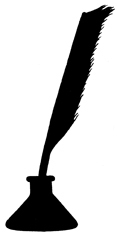 A Warm Welcome to Bloxley BottomWe are a small village, a distillation of hundreds of similar hamlets throughout the realm. And similarly, we in Bloxley Bottom have our fair share of swells and ne’er do-wells, our virtuous and our sinners. Over the next weeks, you will meet some of our residents and learn our stories, from the outlandish to the exquisite. No doubt you will like some of us more than others – we shall leave that choice to your individual discretion. There is, after all, no accounting for taste
A Warm Welcome to Bloxley BottomWe are a small village, a distillation of hundreds of similar hamlets throughout the realm. And similarly, we in Bloxley Bottom have our fair share of swells and ne’er do-wells, our virtuous and our sinners. Over the next weeks, you will meet some of our residents and learn our stories, from the outlandish to the exquisite. No doubt you will like some of us more than others – we shall leave that choice to your individual discretion. There is, after all, no accounting for taste.
Briefly, Baron Bloxley and his family lead the community, along with the vicar of All Saints Church, Mr. Newton and his wife. But truth to tell, the reigning sovereign of the neighborhood is the baron’s mama, Lady Louisa, dowager baroness Bloxley, daughter of the earl of Kenley. But wait, we are getting ahead of ourselves.
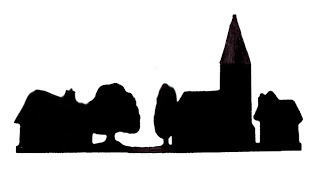
Our fictional Bloxley Bottom is a few miles inland from the channel in eastern Kent, a short ride from the town of Deal and Walmer Castle, the latter presided over by the Lord Warden of the Cinque Ports, none other than His Grace the Duke of Wellington himself, a frequent visitor to our fair village. We are eight miles north of Dover and a two dozen east of Canterbury, perfectly placed in the midst of verdant fields and lush orchards, the best of the earth’s bounty at our fingertips. We boast a small but fine inn, an efficient blacksmith, a few shops with the latest goods from London bazaars, and a full complement of curious characters of all sorts.
In essence, Bloxley Bottom is a happy place – at least until you pierce its placid exterior. Look beneath the surface and you shall soon uncover The Secrets of Bloxley Bottom. Starting tomorrow.
*a serial novel, in episodes
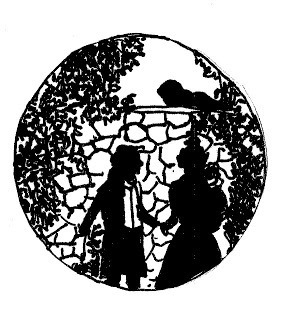
Published on February 14, 2013 01:00
February 12, 2013
A Couple In England - Day Two - Part Five
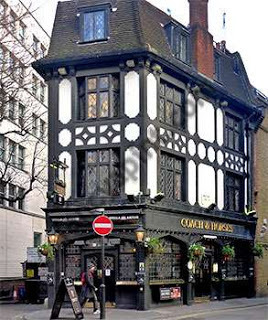
After tearing ourselves away from the Rolls Royce dealership in Berekeley Square, we caught a cab and were soon passing the historic Coach and Horses pub. As we approached the back of the Royal Academy I noticed a long line and asked the driver what was on at the RA that had people lining up as far as the eye could see. "It's not the RA," he told me, "They're all waiting to get into Abercrombie and Fitch."
Abercrombie and Fitch!? "We've got them in every mall in America."
"Well, this is the only one in London and it just might be the only one in the UK. Next time you're coming over, you should bring boxes of their stuff with you and sell it on the street. You'd make a mint."
Not a bad idea.
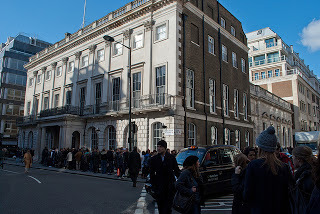
Our destination was Ye Olde Chesire Cheese in Fleet Street. You may recall from a previous post that on a past trip over, Hubby and I had twice tried to eat there and had found it closed each time. I was determined that he should see it. Why this should be, since the man could care less about British, not to say London, history I can't say. However, as we pulled up this time, we could see that it was, indeed open. Huzza!
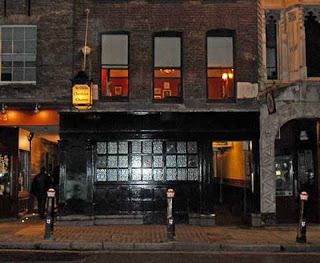
We went into the alley, where the entrance stands.
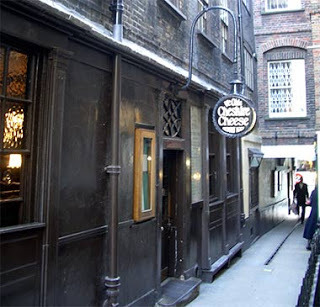
And through the door to the entry hall.
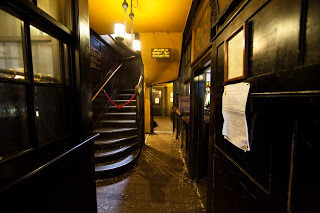
Directly to the right is a bar room.
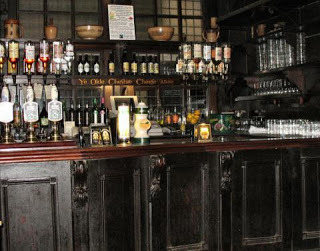
I'll tell you right now that I did not take these pictures, as when we were there it was so crowded that none of these architectural details would have been visible. Not only was it crowded, but there was no host or reception point at all. I flagged down a harried looking waitress in the front room and asked about a table and was told that it would be at least forty-five minutes before a table in her section would be free. There was no waiting list to put one's name down upon, one should just wander from room to room and look for a free table.
Turning away from her, my mind worked furiously for a way to put this information into more positive terms before passing it on to Hubby.
"What did she say? Did you put our name down? How long is the wait?" he asked in the very next moment. Truly, I had nothing else so I reluctantly went with the truth.
"Forty five minutes, no list, we just have to walk around until we find a free table."
"Oh, great. With this crowd?"
"Come on, we'll go look for a table and you can see the place properly. Dr. Johnson used to come here." Shut up, you idiot. Now is not the time for Dr. Johnson. "And Dickens. Dickens used to come here, too."
"What? I can't hear you with all this noise!"
"I said let's look in this back room here." Nothing. Not a seat in sight. "Okay, we can try downstairs."
"What?"
"Watch your head. The ceiling is really low in the stairwell. Really, watch your . . . . . . "
"Christ, I almost hit my head! Who in their right mind makes a ceiling this low?"
Not a free table in sight here either. Not a free stool at the bar. Not an employee who looked as though they gave a toss one way or another whether we stayed or not. The rooms themselves are quite small and, crowded as they were that night, they seemed to shrink as the noise level continued to rise.
"How badly do you want to eat here?" the Hubby yelled into my ear.
"It's not so much that I'm set on the food," I replied. "I really wanted you to see the place."
"I've seen it. Can we go now?" Needless to say, we left. And started up Fleet Street back towards Piccadilly. We hadn't walked very far before I was compelled to enter an alleyway off to our right.
"What are you doing? What's in there?"
"Come and see. It's Dr. Johnson's house."
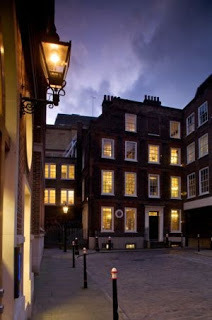
If you've never been to Gough Square, where the House stands, it's terrifically atmospheric and even more so at dusk.
I stared round at our surroundings for a few moments. "When a man is tired of London, a man is tired is life, for there is in London all that life can afford."
"My good man."
Back on Fleet Street, we walked a bit more and passed the Courts before the Hubby asked the question of the hour. "Where are we going to eat?"
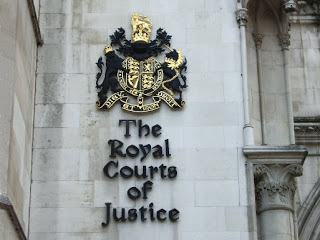
"How hungry are you?"
"I can eat."
"Yeah, but do you have to eat right now? Or can you wait a bit?"
"How long a bit?"
"I'm thinking we could take a cab back to Burger and Lobster."
"My girl. I'm thinking I love you."
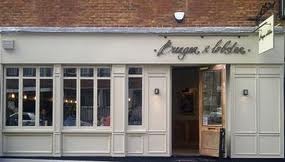
So back we went to Clarges Street.
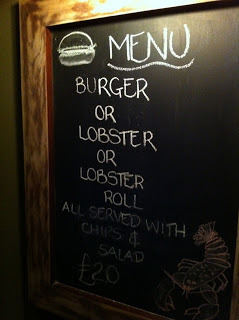
Where I showed Hubby the extensive menu. Everything comes with chips and a salad and everything is twenty pounds. Unless you want to upsize your lobster, but I'm getting ahead of myself . . . .
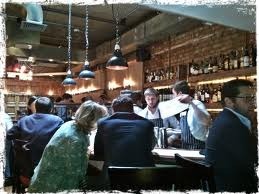
There were no empty tables at Burger and Lobster, either, but there were two empty seats at the bar. We bellied up, ordered cocktails and waited for our table. And waited. And ordered another round. And chatted with the barman. And drank. And waited some more. Hubby, surprisingly, was uncomplaining. It may have been the convivial atmosphere. Or the three drinks. Reader, a fine time was had by all.
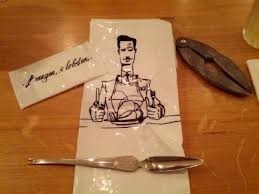
We were finally shown to a table and when we both ordered the lobster, our server asked if we wanted anything larger than the standard pound and a quarter crustacean. Hubby and I both opted for two pounders.
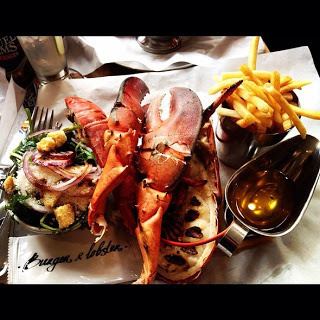
Yes, dinner tasted as delicious as it looked. And we were each served a complimentary dessert due to our long wait. Meal over, we put our coats and scarves back on and ventured out into the brisk night and walked literally around the corner to our hotel. The perfect end to a truly perfect day. Yes, at long last, Day Two is finally over. You've been real troopers putting up with my wanderings thus far and I thank you for your patience.
Day Three Coming Soon . . . . . .
Published on February 12, 2013 00:30
February 10, 2013
The Tour of Dr. Syntax, Part 8
The Tour of Dr. Syntax in Search of the Picturesque, Part 8
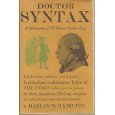
A Few Notes about Poetry...
At the time of the publication of Dr. Syntax by William Combe, the form of iambic tetrameter was very popular.
Think of Byron's She Walks in Beauty (1814):
"She walks in beauty, like the night
Of cloudless climes and starry skies;
And all that's best of dark and bright
Meet in her aspect and her eyes:
Thus mellow'd to that tender light
Which heaven to gaudy day denies."
People were quite accustomed to reading verse with four beats to a line, though I seem to recall that iambic pentameter (five beats per line) was taught more in my lit classes...
Combe in Dr Syntax uses the AABB of rhyming couplets; Byron, above, used ABAB. Both are equally familiar.
I admit that when I read the lines of Dr. Syntax aloud, I unconsciously use a sing-song expression that make is sound a little childish -- sort of like nursery rhymes , or "Roses are Red, Violets are Blue, Sugar is Sweet, and so are you."
In any case, The Adventures of Dr. Syntax in Search of the Picturesque is poetry of a type that seems to lead to comic effects, just what the writer and publisher had in mind. Just as an example, here are the openings six lines from Canto 12. Can you read them aloud without sounding sing-song?
Excerpts from Canto XII LIFE is a journey, — on we go,
Through many a scene of joy and woe: Time flits along, and will not stay,
Nor let us linger on the way:
Like as a stream, whose varying course
Now rushes with impetuous force.
To pick up the story, we left Dr. Syntax with the Squire and his wife...singing songs. Eventually they retire and the next morning, Dr. S. explains his quest for scenes of the picturesque.
"'No,' he (Dr. S.) exclaim'd, 'I must away: — I have a splendid book to make. To form a Tour — to paint a Lake; And, by that well projected Tome, To carry fame and money home...'" The Squire insists on giving Dr. S. a letter of introduction to a noble friend, and Syntax, after three kisses from the Squire's wife, resumes his journey, finally assured of his own fortune at last. When he arrives at the handsome home of Sir John, Syntax has more interest in his dinner than the Lord's artworks.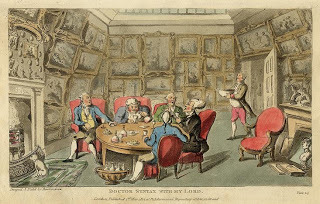 Doctor Syntax with My Lord -- by Rowlandson"My Lord. 'What think you, Doctor, of the show Of pictures that around you glow?'" Syntax. 'I'll by-and-by enjoy the treat; But now, my Lord, I'd rather eat.'" Despite the Doctor's rudeness, the butler eventually conducts him to the cellar where he is invited to partake of the Lord's beer."At length the potent liquor flows, Which makes poor man forget his woes. Syntax exclaim'd, " Here's Honour's boast;- The health of our most noble Host — And let fair Devon crown the toast." The cups were cheer'd with loyal song; But cups like these ne'er lasted long. And Syntax stammer'd, "Do you see ? Now I'm of this fam'd cellar free, I wish I might be quickly led T' enjoy my freedom in a bed." He wish'd but once, and was obey'd, And soon within a bed was laid, Where, all the day's strange business o'er, He now was left to sleep and snore."
Doctor Syntax with My Lord -- by Rowlandson"My Lord. 'What think you, Doctor, of the show Of pictures that around you glow?'" Syntax. 'I'll by-and-by enjoy the treat; But now, my Lord, I'd rather eat.'" Despite the Doctor's rudeness, the butler eventually conducts him to the cellar where he is invited to partake of the Lord's beer."At length the potent liquor flows, Which makes poor man forget his woes. Syntax exclaim'd, " Here's Honour's boast;- The health of our most noble Host — And let fair Devon crown the toast." The cups were cheer'd with loyal song; But cups like these ne'er lasted long. And Syntax stammer'd, "Do you see ? Now I'm of this fam'd cellar free, I wish I might be quickly led T' enjoy my freedom in a bed." He wish'd but once, and was obey'd, And soon within a bed was laid, Where, all the day's strange business o'er, He now was left to sleep and snore."
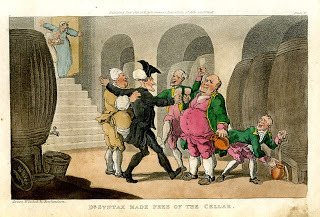 Doctor Syntax Made Free of the Cellar -- by Rowlandson
Doctor Syntax Made Free of the Cellar -- by Rowlandson
Excerpts from Canto XIII Dr. Syntax has a night of dreaming he has been named a bishop...but is roused in the morning to breakfast with Sir John ...but declines the invitation to hunt.
"Your sport, my Lord, I cannot take, For I must go and hunt a lake; And while you chase the flying deer, I must fly off to Windermere, Instead of hallooing to a fox, I must catch echoes from the rocks; With curious eye and active scent, I on the Picturesque am bent..." Dr. Syntax travels four days until he reaches Keswick "Soon as the morn began to break. Old Grizzle bore him to the Lake; Along the banks he gravely pac'd. And all its various beauties trac'd; When, lo, a threat'ning storm appear d! Phoebus the scene no. longer cheer'd;The dark clouds sank on ev'ry hill; The floating mists the valleys fill:Nature, transform'd, began to low'r. And threaten'd a tremendous show'r."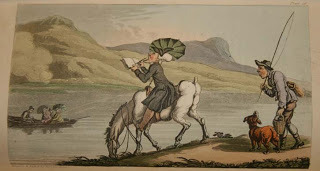 Doctor Syntax Sketching the Lake -- by Rowlandson
Doctor Syntax Sketching the Lake -- by Rowlandson
'I love,' he cried, 'to hear the rattle, When elements contend in battle; For I insist, though some may flout it, Who write about it, and about it. That we the Picturesque may find In thunder loud, or whistling wind: And often, as I fully ween. It may be heard as well as seen; For, though a pencil cannot trace A sound as it can paint a place, The pen, in its poetic rage. Can make it figure on the page.'" Later, when Dr. Syntax and his horse Grizzle are thoroughly wet... To that warm inn they quickly hied. Where Syntax, by the fire-side, Sat in the landlord's garments clad, But neither sorrowful nor sad: Nor did he waste his hours away, But gave his pencil all its play, And trac'd the landscapes of the day. Excerpts from Canto XIV The next morning, Dr. Syntax meets up with a party of tourists with whom he discusses the nature of the picturesque and how the concept differs from the idea of the beauty of simple nature."'The first, the middle, and the last. In Picturesque, is bold contrast; And painting has no nobler use Than this grand object to produce. Such is my thought, and I'll pursue it ; There's an example — you shall view it. Look at that tree; then take a glance At its fine, bold protuberance ; Behold those branches — how their shade Is by the mass of light display'd : Look at that light, and see how fine The backward shadows make it shine : The sombre clouds that spot the sky. Make the blue vaulting twice as high; And where the sun-beams warmly glow. They make the hollow twice as low. The Flemish painters all surpass In making pictures smooth as glass : In Cuyp's best works there's pretty painting, But the bold picturesque is wanting.'"This satirical view of how nature is picturesque only in its exaggerated form is the message that William Combe, writer of Dr Syntax, was imparting -- to make fun of those who extolled only the virtue of the twisted and grotesque.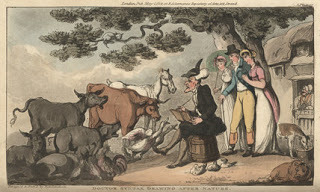 Dr. Syntax Drawing After Nature -- by RowlandsonA Squire of the party of travelers invites Dr. Syntax to his home where he is ca;led upon to sketch his host's fine cattle. "The Doctor now, with genius big, First drew a cow, and next a pig: A sheep now on the paper passes. And then he sketched a group of asses : Nor did he fail to do his duty In giving Grizzle all her beauty. …"As is so frequent, Dr. Syntax ends his day with a fine meal:"At length they to the house retreated. And round the supper soon were seated ; When the time quickly passed away. And gay good-humour clos'd the day."End of Canto XIV More Adventures of Dr. Syntax in Search of the Picturesque....coming soon.
Dr. Syntax Drawing After Nature -- by RowlandsonA Squire of the party of travelers invites Dr. Syntax to his home where he is ca;led upon to sketch his host's fine cattle. "The Doctor now, with genius big, First drew a cow, and next a pig: A sheep now on the paper passes. And then he sketched a group of asses : Nor did he fail to do his duty In giving Grizzle all her beauty. …"As is so frequent, Dr. Syntax ends his day with a fine meal:"At length they to the house retreated. And round the supper soon were seated ; When the time quickly passed away. And gay good-humour clos'd the day."End of Canto XIV More Adventures of Dr. Syntax in Search of the Picturesque....coming soon.

A Few Notes about Poetry...
At the time of the publication of Dr. Syntax by William Combe, the form of iambic tetrameter was very popular.
Think of Byron's She Walks in Beauty (1814):
"She walks in beauty, like the night
Of cloudless climes and starry skies;
And all that's best of dark and bright
Meet in her aspect and her eyes:
Thus mellow'd to that tender light
Which heaven to gaudy day denies."
People were quite accustomed to reading verse with four beats to a line, though I seem to recall that iambic pentameter (five beats per line) was taught more in my lit classes...
Combe in Dr Syntax uses the AABB of rhyming couplets; Byron, above, used ABAB. Both are equally familiar.
I admit that when I read the lines of Dr. Syntax aloud, I unconsciously use a sing-song expression that make is sound a little childish -- sort of like nursery rhymes , or "Roses are Red, Violets are Blue, Sugar is Sweet, and so are you."
In any case, The Adventures of Dr. Syntax in Search of the Picturesque is poetry of a type that seems to lead to comic effects, just what the writer and publisher had in mind. Just as an example, here are the openings six lines from Canto 12. Can you read them aloud without sounding sing-song?
Excerpts from Canto XII LIFE is a journey, — on we go,
Through many a scene of joy and woe: Time flits along, and will not stay,
Nor let us linger on the way:
Like as a stream, whose varying course
Now rushes with impetuous force.
To pick up the story, we left Dr. Syntax with the Squire and his wife...singing songs. Eventually they retire and the next morning, Dr. S. explains his quest for scenes of the picturesque.
"'No,' he (Dr. S.) exclaim'd, 'I must away: — I have a splendid book to make. To form a Tour — to paint a Lake; And, by that well projected Tome, To carry fame and money home...'" The Squire insists on giving Dr. S. a letter of introduction to a noble friend, and Syntax, after three kisses from the Squire's wife, resumes his journey, finally assured of his own fortune at last. When he arrives at the handsome home of Sir John, Syntax has more interest in his dinner than the Lord's artworks.
 Doctor Syntax with My Lord -- by Rowlandson"My Lord. 'What think you, Doctor, of the show Of pictures that around you glow?'" Syntax. 'I'll by-and-by enjoy the treat; But now, my Lord, I'd rather eat.'" Despite the Doctor's rudeness, the butler eventually conducts him to the cellar where he is invited to partake of the Lord's beer."At length the potent liquor flows, Which makes poor man forget his woes. Syntax exclaim'd, " Here's Honour's boast;- The health of our most noble Host — And let fair Devon crown the toast." The cups were cheer'd with loyal song; But cups like these ne'er lasted long. And Syntax stammer'd, "Do you see ? Now I'm of this fam'd cellar free, I wish I might be quickly led T' enjoy my freedom in a bed." He wish'd but once, and was obey'd, And soon within a bed was laid, Where, all the day's strange business o'er, He now was left to sleep and snore."
Doctor Syntax with My Lord -- by Rowlandson"My Lord. 'What think you, Doctor, of the show Of pictures that around you glow?'" Syntax. 'I'll by-and-by enjoy the treat; But now, my Lord, I'd rather eat.'" Despite the Doctor's rudeness, the butler eventually conducts him to the cellar where he is invited to partake of the Lord's beer."At length the potent liquor flows, Which makes poor man forget his woes. Syntax exclaim'd, " Here's Honour's boast;- The health of our most noble Host — And let fair Devon crown the toast." The cups were cheer'd with loyal song; But cups like these ne'er lasted long. And Syntax stammer'd, "Do you see ? Now I'm of this fam'd cellar free, I wish I might be quickly led T' enjoy my freedom in a bed." He wish'd but once, and was obey'd, And soon within a bed was laid, Where, all the day's strange business o'er, He now was left to sleep and snore."
 Doctor Syntax Made Free of the Cellar -- by Rowlandson
Doctor Syntax Made Free of the Cellar -- by RowlandsonExcerpts from Canto XIII Dr. Syntax has a night of dreaming he has been named a bishop...but is roused in the morning to breakfast with Sir John ...but declines the invitation to hunt.
"Your sport, my Lord, I cannot take, For I must go and hunt a lake; And while you chase the flying deer, I must fly off to Windermere, Instead of hallooing to a fox, I must catch echoes from the rocks; With curious eye and active scent, I on the Picturesque am bent..." Dr. Syntax travels four days until he reaches Keswick "Soon as the morn began to break. Old Grizzle bore him to the Lake; Along the banks he gravely pac'd. And all its various beauties trac'd; When, lo, a threat'ning storm appear d! Phoebus the scene no. longer cheer'd;The dark clouds sank on ev'ry hill; The floating mists the valleys fill:Nature, transform'd, began to low'r. And threaten'd a tremendous show'r."
 Doctor Syntax Sketching the Lake -- by Rowlandson
Doctor Syntax Sketching the Lake -- by Rowlandson'I love,' he cried, 'to hear the rattle, When elements contend in battle; For I insist, though some may flout it, Who write about it, and about it. That we the Picturesque may find In thunder loud, or whistling wind: And often, as I fully ween. It may be heard as well as seen; For, though a pencil cannot trace A sound as it can paint a place, The pen, in its poetic rage. Can make it figure on the page.'" Later, when Dr. Syntax and his horse Grizzle are thoroughly wet... To that warm inn they quickly hied. Where Syntax, by the fire-side, Sat in the landlord's garments clad, But neither sorrowful nor sad: Nor did he waste his hours away, But gave his pencil all its play, And trac'd the landscapes of the day. Excerpts from Canto XIV The next morning, Dr. Syntax meets up with a party of tourists with whom he discusses the nature of the picturesque and how the concept differs from the idea of the beauty of simple nature."'The first, the middle, and the last. In Picturesque, is bold contrast; And painting has no nobler use Than this grand object to produce. Such is my thought, and I'll pursue it ; There's an example — you shall view it. Look at that tree; then take a glance At its fine, bold protuberance ; Behold those branches — how their shade Is by the mass of light display'd : Look at that light, and see how fine The backward shadows make it shine : The sombre clouds that spot the sky. Make the blue vaulting twice as high; And where the sun-beams warmly glow. They make the hollow twice as low. The Flemish painters all surpass In making pictures smooth as glass : In Cuyp's best works there's pretty painting, But the bold picturesque is wanting.'"This satirical view of how nature is picturesque only in its exaggerated form is the message that William Combe, writer of Dr Syntax, was imparting -- to make fun of those who extolled only the virtue of the twisted and grotesque.
 Dr. Syntax Drawing After Nature -- by RowlandsonA Squire of the party of travelers invites Dr. Syntax to his home where he is ca;led upon to sketch his host's fine cattle. "The Doctor now, with genius big, First drew a cow, and next a pig: A sheep now on the paper passes. And then he sketched a group of asses : Nor did he fail to do his duty In giving Grizzle all her beauty. …"As is so frequent, Dr. Syntax ends his day with a fine meal:"At length they to the house retreated. And round the supper soon were seated ; When the time quickly passed away. And gay good-humour clos'd the day."End of Canto XIV More Adventures of Dr. Syntax in Search of the Picturesque....coming soon.
Dr. Syntax Drawing After Nature -- by RowlandsonA Squire of the party of travelers invites Dr. Syntax to his home where he is ca;led upon to sketch his host's fine cattle. "The Doctor now, with genius big, First drew a cow, and next a pig: A sheep now on the paper passes. And then he sketched a group of asses : Nor did he fail to do his duty In giving Grizzle all her beauty. …"As is so frequent, Dr. Syntax ends his day with a fine meal:"At length they to the house retreated. And round the supper soon were seated ; When the time quickly passed away. And gay good-humour clos'd the day."End of Canto XIV More Adventures of Dr. Syntax in Search of the Picturesque....coming soon.
Published on February 10, 2013 00:00
Kristine Hughes's Blog
- Kristine Hughes's profile
- 6 followers
Kristine Hughes isn't a Goodreads Author
(yet),
but they
do have a blog,
so here are some recent posts imported from
their feed.



